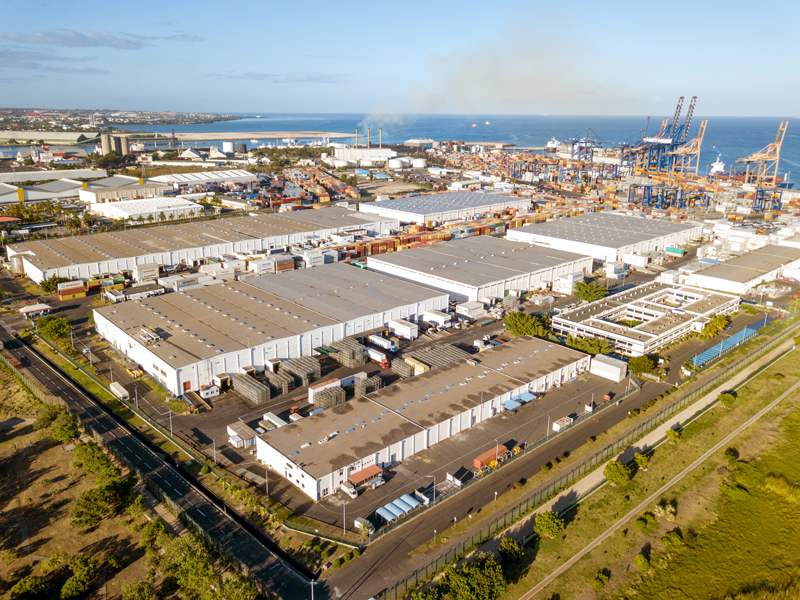
From its base in Port Louis, Mauritius, an island 2,000km off the coast of South-East Africa, MFD Group has built up the largest and most comprehensive logistics platform in the Indian Ocean. The island nation offers a freeport scheme, meaning incoming goods are not subject to customs duties, and goods that are sold from Mauritius are not subject to VAT. As MFD works to meet the demands of regional clients, the company is also targeting growth further afield.
Mauritius has emerged as a natural business hub for international trade thanks to its ideal location, political and social stability, and its ever-expanding infrastructure system
MFD Group first opened its doors in 1998. Hans Herchenroder, the firm’s chief commercial officer, told World Finance the company has not stopped growing in terms of size and quality of service since. It was not always smooth sailing for the logistics business, though. “When we started out, the local and regional markets were not open to outsourcing their logistics requirements,” he said.
But through “hard work and sheer determination”, Herchenroder explained how the company went on to build the largest third-party logistics firm in the region. “We went through very difficult times but have emerged stronger than ever and with a clear vision.”
An exciting market
With that impressive title under its belt, the company is now looking to expand into Africa, which Herchenroder said was a natural next step: “Our business model is ideally suited for most markets in Africa, where we intend to be an industry leader.” Mauritius has emerged as a natural business hub for international trade thanks to its ideal location, political and social stability, reliability, and its ever-expanding infrastructure system.
Herchenroder elaborated further: “Given the developed state of the economy as compared with other countries in the region, Mauritius has a very competitive logistics sector. Be it in warehousing or other links of the supply chain, Mauritius has a very satisfactory level of service.”
The country’s special economic zone is another obvious benefit for a logistics company like MFD. Herchenroder said the freeport regime means a zero percent tax on corporate profits, 100 percent profit repatriation and no exchange controls. It also means access to regional trade agreements, like the Common Market for Eastern and Southern Africa and the Southern African Development Community, as well as to international trade agreements such as the Cotonou Agreement and the African Growth and Opportunity Act. “And, finally, being part of the most exciting place on Earth right now: Africa,” Herchenroder added.
A turning tide
The market for container-based logistics is growing more vibrant all the time, according to Herchenroder, with container terminals receiving upgrades to boost efficiencies and with larger vessels calling at Indian Ocean ports. “We also see more sophisticated demand emerging for supply chain services,” he said.
However, it is the rapid development of a middle class in Africa that is the most exciting change. According to a 2017 report by the African Development Bank, the continent’s population has grown to one billion since 2010, and its middle class has surged to 350 million. As the population continues to grow, consumer spending is projected to rise from $680bn in 2008 to $2.2trn by 2030.
“This creates market opportunities for value-added logistics services,” Herchenroder told World Finance. MFD sees this concept of ramping up the services provided by carriers as a key moneymaker going forward. He added: “The local market is limited and we don’t expect to grow in a major way in Mauritius organically. We see a demand for more sophisticated services and value-added services, and we intend to fully meet these demands.”
Looking to the future
MFD is currently seeking to expand its capacity to service clients, with the firm taking its concept of ‘all services on one platform’ to Africa. MFD’s one-stop shop already includes a variety of premises and equipment for storage, manufacturing and management, including 65,000sq m of ambient temperature warehouses, 16,000sq m of cold rooms, 6,500sq m of office space, a container park, a transport fleet, and 24-hour security.
MFD is also developing new logistics platforms inland in Mauritius, as well as at the airport. Herchenroder said the use of airfreight cargo is taking off, as more capacity is now at hand and demand is rising for fresh products, driven by more wealth. He added: “The major developments in Mauritius are the Riche Terre logistics zone and the airport cargo zone. MFD will play a major role in these two projects. We intend to keep our position of number one in Mauritius and in the region.”


